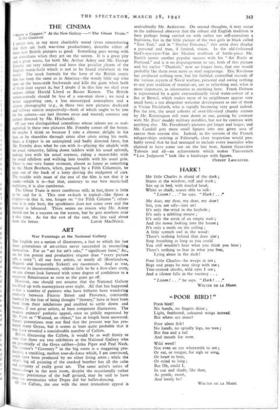THE CINEMA
„spare a Copper." At the New Gallery—" The Ghost Train." At the Gaumont I coal) not, in my most charitable mood (even remembering that they are both war-time productions), describe either of these new British pictures as good. Something goes wrong with our comedians when they get on the screen. It is a great pity and a great waste, for both Mr. Arthur Askey and Mr. George Formby are very talented and have that peculiar charm of the English music-halls which is not to be found elsewhere in the world. The stock formula for the hero of the British comic film has been the same as in America—the weedy little sap who runs up the bean-stalk backwards and kills the giant when both of them least expect it; but I doubt if in this line we shall ever surpass either Harold Lloyd or Buster Keaton. The British screen-comedy should be less of a one-man show ; we need a better supporting cast, a less stereotyped atmosphere and a crisper photography (e.g., in these two new pictures dockyard and railway station respectively—both of which ought to be jam for the camera—are just thrown away and wasted; contrast any picture directed by Mr. Hitchcock).
Of our two distinguished comedians whose talents are so mal- exploited in these two pictures Mr. Formby comes off the better. Or maybe I think so because I take a chronic delight in his face, as he shambles through crisis after crisis airing his teeth. Spare a Copper is an uninspired and badly directed farce, but Mr. Formby does what he can with it—playing the ukulele with his usual virtuosity, falling down ladders with his usual aplomb, making love with his usual coyness, riding a motor-bike with his usual nihilism and walking into trouble with his usual grin. There is one very funny moment, almost as funny as something by the Marx Brothers, when, pursued by a Fifth Columnist, he pops out of the back of a lorry driving the midgetest of cars. The trouble with most of the rest of the film is not that it is crude—which it is—but that, contrary to our best music-hall traditions, it is also cumbrous.
The Ghost Train is more cumbrous still; in fact, there is little to be said for it. This new re-hash is topical—like Spare a Copper—in that it, too, hinges on " the Fifth Column "; other- wise it is stale beer, the spookiness does not come over and the humour is laboured. There seems no -reason why Mr. Askey should not be a success on the screen, but he gets nowhere near it this time. As for the rest of the cast, the less said about






























 Previous page
Previous page